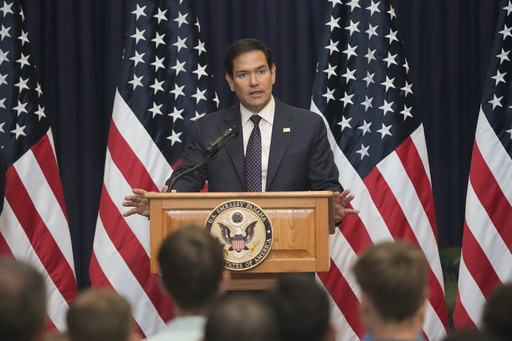PANAMA CITY — U.S. Secretary of State Marco Rubio communicated with Panamanian President José Raúl Mulino on Sunday, emphasizing the need for the Central American nation to diminish Chinese influence around the Panama Canal swiftly to avoid potential consequences from the Trump administration.
Rubio’s discussions with Mulino took place during his inaugural overseas visit as America’s chief diplomat, where he faced challenges after Mulino resisted U.S. demands regarding the Canal’s oversight—a crucial passageway for international commerce.
Following their conversation, Mulino informed reporters that Rubio did not issue a tangible threat regarding a military takeover of the canal or any form of forceful action.
While representing President Trump, who has called for the canal to be returned to U.S. jurisdiction, Rubio indicated Trump had preliminarily concluded that China’s activities in the canal region were in violation of a treaty established when the waterway was handed over to Panama in 1999. This treaty stipulates the canal’s permanent neutrality, a point Rubio intended to emphasize during his visit to the site later that day.
Rubio made it clear that the current circumstances were unacceptable and that if immediate adjustments weren’t made, the United States might need to take necessary actions to safeguard its treaty rights, according to a summary provided by the State Department.
Such strong diplomatic language is rare but aligns with the assertive foreign policy direction set by the Trump administration. The president has intensified pressure on neighboring countries and allies, including demands related to the canal, while also imposing significant tariffs on Canada and Mexico, which led to retaliatory measures and a trade dispute.
Conversely, Mulino described the discussions with Rubio as “respectful” and “positive,” noting he did not perceive a genuine threat against the treaty’s integrity.
He recognized the concerns raised in Washington regarding China’s influence over the canal’s terminal ports but assured that an audit of the consortium managing them was underway, and that further details pertaining to the audit would be offered to Rubio.
Mulino also announced that Panama would not extend its partnership with China’s Belt and Road Initiative when the current agreement expires. Panama joined the initiative, which funds infrastructure development but has faced criticism for placing considerable debt burdens on participating nations, after switching its diplomatic recognition from Taiwan to Beijing.
On the same day, around 200 demonstrators marched in Panama City, waving the national flag and chanting slogans such as “Marco Rubio out of Panama,” “Long live national sovereignty,” and “One territory, one flag.” Some protesters burned a banner depicting Trump and Rubio but were halted before they could reach the presidential palace by riot police.
Rubio also brought attention to immigration issues—one of Trump’s key concerns—highlighting the need for cooperation in this area and expressing gratitude to Mulino for the repatriation of migrants. However, Rubio’s visit coincided with a halt in U.S. foreign aid funding, which has led to the suspension of programs aimed at combating illegal immigration and crime in Central America.
In an opinion piece published on Friday, Rubio voiced his concerns regarding mass migration, drug trafficking, and the antagonistic policies of Cuba, Nicaragua, and Venezuela, arguing that the ports at both ends of the canal, operated by a Chinese-owned company, render the waterway susceptible to influence from the Chinese government.
Rubio stated emphatically, “The president has made it clear he desires to manage the canal again,” acknowledging that this proposal is not well-received by the Panamanian people.
Despite Mulino’s resistance to discussing ownership negotiations, some analysts suggest that Panama might consider a compromise wherein management of the canal operations is reassigned from the Hong Kong-based Hutchison Ports, which has a controversial 25-year no-bid extension to operate the ports. An audit examining this agreement is already in progress and could potentially lead to a bidding process.
It remains uncertain whether Trump would view a transfer of the concession to an American or European entity as fulfilling his stipulations, which seem to extend beyond mere operational oversight.
Rubio’s journey, which will also take him to El Salvador, Costa Rica, Guatemala, and the Dominican Republic, occurs amid a freeze on U.S. foreign aid. The State Department announced on Sunday that Rubio had authorized waivers for certain essential programs in the countries he is visiting, although further details are not yet available.




